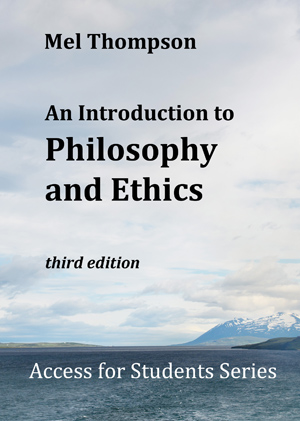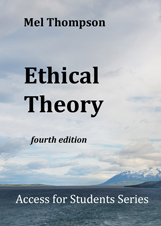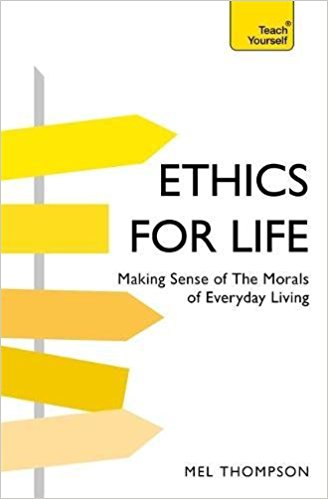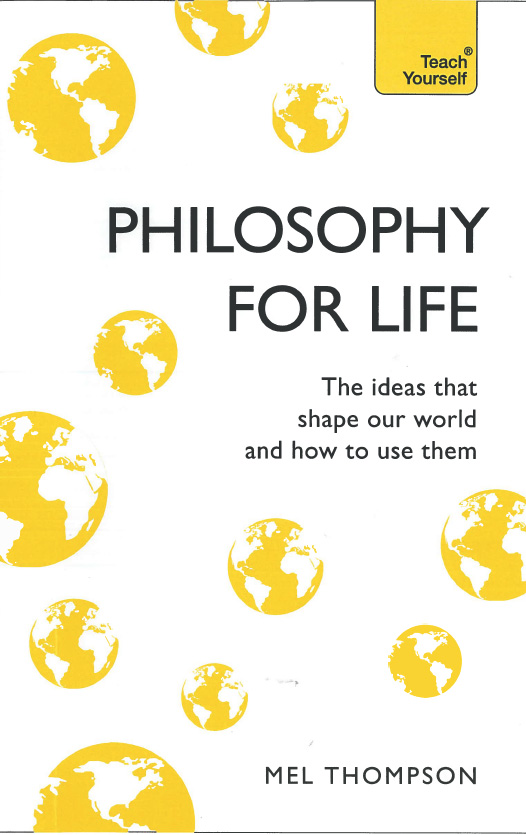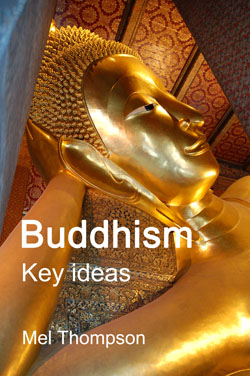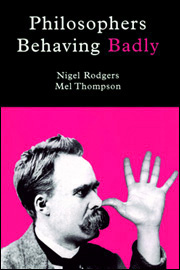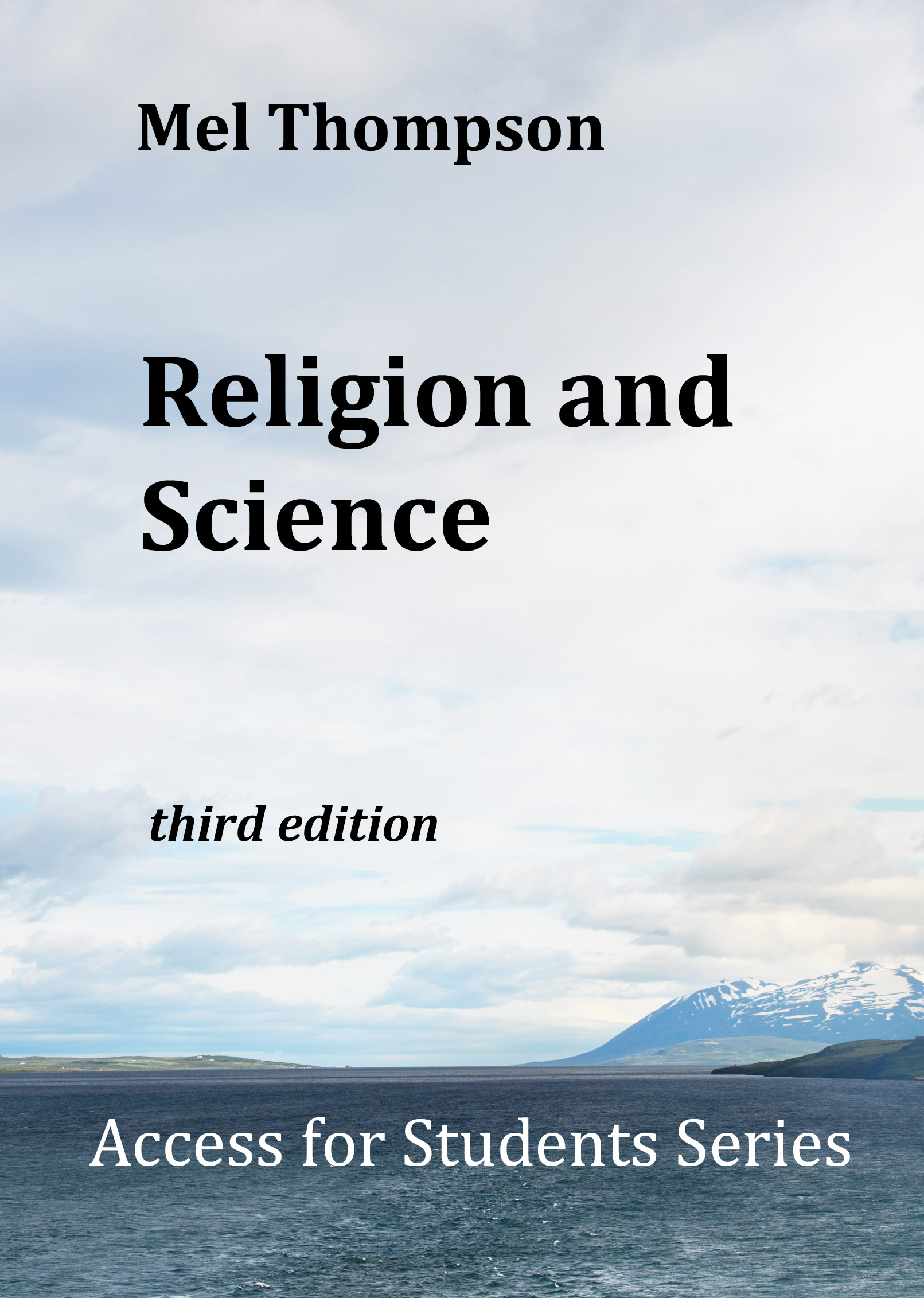NATURAL LAW ETHICS
‘Natural Law’ has been one of the most influential moral theories of all time and is still a key feature of Catholic moral thinking. It is important because it links morality to a fundamental understanding of human nature, and also (in its religious form, for it can also be used as a secular and autonomous argument) to belief in God, forming a bridge between ethics and the philosophy of religion.
Contents
Some quotes from Aquinas' Summa Theologica
Which side was Aquinas really on?
Natural Law and Protestant Christianity
Some advantages of a Natural Law argument in ethics
Natural Law and homo economicus - a rant from my blog
Natural Law and Hobbes - a fundamental choice.
Aristotle
The ‘Natural Law’ theory of ethics originated in Aristotle’s idea that everything has a purpose, revealed in its design, and that its supreme ‘good’ is to be sought in fulfilling that purpose. In the opening of his Nicomachean Ethics, he says:
‘Every craft and every investigation, and likewise every action and decision, seems to aim at some good; hence the good has been well described as that at which everything aims.’
Aristotle distinguished between efficient causes and final causes:
- An efficient cause is an agent of change. It exists immediately before the thing we are examining; it is what a scientist would call a cause.
- A final cause is the ideal, the aim, the purpose for which something comes about. It is reflected in the essential nature of that thing; if you know what a thing is, you will understand what it is for.
The final cause of a knife is ‘cutting’, the efficient cause of the knife is the person who made it. Hence, for Aristotle, everything has a ‘good’, which can be achieved by fulfilling its ‘final cause.’
Key questions here: Do human beings have a final cause? Is it possible to say that every action has one particular ‘final cause’ by which we can discern its ‘good’? Or does the significance and meaning of an action vary according to circumstances?
According to Aristotle, the ‘good’ for humans is eudaimonia, which is often translated as ‘happiness’, but means rather more than that. It includes the idea of living well and of doing well. He argued that people might do other things in order to be happy, but that it would make no sense to try to be happy in order to achieve something else!
Thus happiness is the basic good, making everything else worthwhile: -
‘... we regard something as self-sufficient when all by itself it makes a life choiceworthy and lacking nothing; and that is what we think happiness does.’
(Nicomachean Ethics, Book 1)
In Aristotle’s philosophy, things have an essence – a ‘real’ nature, which defines what they are. If you understand what you are, you know what your life is for, how you relate to the rest of the world and so on. The aim of life is to fulfil your essence.
Hence the importance of his distinction between an efficient cause and a final cause – it is the latter that is the ‘end’ to be achieved, in which your essence is fulfilled.
Aristotle was also concerned to show that living the good life was not a individual thing, but that it involved living at one with others in society. Happiness, as the final goal of humankind, does not imply individual selfishness.
Aristotle regards intellectual reasoning as the highest of all human activities – for man is essentially a ‘thinking animal.’ But, for Aristotle, reason was not just the ability to think logical thoughts, but of living the good life, in line with the precepts of reason. That is why he sees morality as based on reason, not on emotion or in the hope of getting some reward, or avoiding punishment. Aristotle’s ideal is the ‘great souled’ man, who is rational, balanced, good company among equals and independent. In other words he is worldly, but with his appetites and emotions well controlled by reason.
- Hence, the starting point for Aristotle’s ethics is the working out through reason of one’s essential nature and goal, and of acting accordingly.
He also propounded the idea of a ‘mean’ as a balance between two powerful characteristics. Therefore it is good to be brave and self-assertive rather than too rash and pugnacious on the one hand, or too timid and self-effacing on the other.
Two points to keep in mind…
There are two things you need to know about Natural Law: first, it isn’t natural, and second, it isn’t ‘law’.
- Natural Law is NOT simply about what nature does (it is not ‘natural’ in the sense of being observed in nature). Natural law is based on a rational interpretation of purpose within the world, not simply on an objective account of what is in fact the case. Therefore following natural law is NOT the same thing as behaving naturally. Nature can do all sorts of self-destructive things; by contrast, natural law is about nature as interpreted by human reason.
- Natural Law does not necessarily give you straightforward and dogmatic answers to every situation. It involves a measure of interpretation and can be applied in a flexible way. It does not provide us with a fixed ‘Law’ dictated by nature.
Stoics v Epicureans
Philosophers have always debated whether or not the world has a purpose. In ancient Greece, the Epicureans thought that there was no inherent purpose or meaning in life. The world was an impersonal collection of atoms, and we had to set our own goals and ideals, for the natural order offered none. By contrast the Stoics believed that there was a fundamental design and purpose to the universe (the Logos), and that ones morality ought to be based on aligning oneself with it.
The Stoics – particularly Cicero and Marcus Aurelius – were practical, thoughtful people, determined to bring reason to bear on the political and social issues of their day. For the Stoics, the natural way to respond to this sense of universal order, was to act with integrity, aware of the part we can play within the overall scheme of things. In their view, the right thing to do is to align oneself with the fundamental reason that guides the whole universe, excluding any thoughts of personal gain or the promptings of the emotions.
Notice, in a modern context, that this debate continues, with theists arguing that there is a fundamental purpose to the world (whether or not we understand what it is) given by God, while others do not go beyond the evidence given by science, which simply describes the physical properties of the world – a description that can show causal chains (this happens because of that) but not an overall purpose (why any happens at all).
Aquinas
The ideas of Aristotle and the Stoics were taken up in the 13th cent by Thomas Aquinas (1225-1274) – who saw that the principles of Natural Law could give a sound underpinning for Christian morality.
Aquinas (in Summa Theologiae) argued that what was good was what was reasonable – and that a rule should be ‘an ordinance of reason for the common good’
If the world has meaning and purpose, and if we can know the part we play within it, then we know our own ‘final cause’. Once we know that, we can use our human reason to understand how we should act.
- As presented by Aquinas, the Natural Law is based on the conviction that God created the world, establishing within it a sense of order and purpose that reflects his Will.
- If everything is created for a purpose, human reason, in examining that purpose, should be able to judge how to act in order to fulfil itself and therefore find its own goal and ultimate happiness.
- Since Natural Law is based on reason, it is in principle discoverable by anyone, whether religious or not. For the same reason, it is universal, rather than limited to any one religion or culture.
Since he believed in God as creator, and thus as the one who established order and purpose in the universe, he argued that being subject to divine rule was the means of achieving one’s own final purpose or end:
‘… some things are so produced by God that, being intelligent, they bear a resemblance to Him and reflect His image: wherefore not only are they directed, but they direct themselves to their appointed end by their own actions. And if in thus directing themselves they be subject to the divine ruling, they are admitted by that divine ruling to the attainment of their last end; but are excluded therefrom if they direct themselves otherwise.’
Summa Contra Gentiles Book 3, section 1
Human beings, since they are intelligent, are therefore able to direct themselves and take responsibility for doing what God’s will. If they fail to do that, they are also acting against their own fundamental nature.
Natural Law and religion
Whereas the natural law arguments of Aristotle and the Stoics can provide a secular and autonomous basis for morality, Aquinas adapted it to fit in with Christian teaching, seeing ‘natural law’ as a partial and limited aspect of the Eternal Law given by God. That single fact coloured the use and understanding of natural law, almost confining it to a religious ghetto, until the latter part of the 20th century.
Therefore, in most books on Natural Law, written from within a Catholic tradition, you cannot expect to find a logical argument proving that homosexual acts, masturbation or the use of contraception are morally right. Such conclusions are already given by the Catholic tradition and philosophers working within that tradition see it as their task to use natural law arguments to justify Catholic moral teaching.
So both Aquinas and later philosophers and theologians have sought to use the natural law arguments to give rational justification for Christian morality, but in its modern and broader context, the relationship between religious belief (or specifically, belief in God) and natural law works both ways:
-
If you already believe in a rational, creating and designing God – then you are likely to find Natural Law a convincing approach, since it will confirm your intuition of universal meaning and purpose.
- If you find Natural Law arguments convincing, then you are likely to be attracted to some idea of belief in God, or at least belief in the world as a designed and ordered place.
Which side was Aquinas really on?
It's clear that the official line Aquinas was taking in Summa Theologica was one in which Aristotle's natural law argument was used in the service of the Eternal Law, given by God and backed by religious authority. He used Aristotle's arguments, embracing his thought, but also strangling him in terms of using natural law as an autonomous basis for ethics. But frankly, I'm not really sure, reaading Summa Theologica, which side Aquinas was really on. There is no doubt that the stated intention is to use Aristotle in the service of Christian theology - indeed, that is seen as the whole basis of Aquinas' work, and this has coloured all subsequent interpretation of his arguments within a religious context. But just sometimes, seeing the strength of the arguments, and the clarity with which he presents a secular argument for natural law, I wonder if Aquinas, in spite of himself, would not also accept an autonomous and secular form of ethical argument. If he thought it, he could certainly not have said it openly, and so he simply saluted 'the philosopher', Aristotle.
Natural Law and Protestant Christianity
Christian morality is based on the Bible and the tradition of the Church, rather than on unaided human reason alone. However, Aquinas and others argued that human reason (given by God) could offer a logical basis for those moral precepts that were also known through revelation, and could be used to apply Christian precepts.
This proved a particularly valuable approach for those moral issues (e.g. genetic engineering) which were unknown in Biblical times and to which there could therefore be no obvious appeal to scriptural revelation.
The Natural Law approach was opposed by those Protestant thinkers who saw human reason as ‘fallen’, not to be trusted, and therefore unable to provide a sound basis for moral principles. They saw Christian morality as ‘unreasonable’ in the sense that it was a demand to go well beyond what unaided human reason might suggest as the reasonable way to achieve your human ‘end.’ E.g. Loving your friends and hating your enemies might make sense rationally, and even give one an edge in terms of natural selection; Jesus said that you should love your enemies.
It is therefore possible to see Christian ethics as arising out of principles and a spiritual situation that is in contrast to that of non-Christians. It takes the scriptures (as interpreted by the Church), the authority of Church leaders and the inspiration of the Holy Spirit as sources of authority. By contrast, it sees any system of morality based on human reason as of very limited value. This stems from the theological conviction that, through the ‘Fall’ in the Garden of Eden, all natural human life, including human reason, is separated from God through sin, unable to know and respond to God’s will.
This approach (which has developed in the main within the Protestant traditions) sees no point in trying to use human reason as the basis for ethics; rather, all Christian morality comes through the revelation of God himself. This approach was taken at the Reformation by Luther, and in the 20th century it is found in Protestant writers such as Bonhoeffer (see his Ethics).
Rules and Situations
Natural Law is not a matter of accepting authoritative statements and laws, nor is it a matter of trying to act in a way that mimics nature (i.e. it is not biology acted out as morality). However, Natural Law does claims that we should use our reason to examine the place and purpose that everything has within the universe, and act in a way that reflects that understanding. It is not utilitarian, basing its judgements on the likely results of actions and it is not based on intuitions or emotions, but on reason.
It is important to recognise, however, that Natural Law does make allowances for the differences between particular situations. In other words, human reason can take the general principles offered by Natural Law, and can seek to apply them in particular instances. This approach is sometimes termed ‘casuistry’, which is often a rather pejorative term, used to describe a situation where someone uses clever arguments to show why they can get out of obeying a universal moral principle in their particular circumstances.
The other issue to be considered is the principle of ‘double effect’. Actions often have more than one effect, and we have to decide which of these is the real motive for choosing to perform the action. For example, I may understand that taking a little red wine is good for physical health; it may also happen to taste good and make one drunk. Now the fundamental question is whether the purpose in drinking the wine is to get drunk, and the health benefits are a secondary effect, or whether the intention is to promote one’s health, and becoming drunk is a secondary effect. (This is not a very good example, of course, because if taken in sufficient quantity to induce drunkenness, the health benefits of the wine are eroded.)
A key question here: What was my intention in taking this course of action? If my primary intention was good, I should not be blamed for any secondary effects that result?
Some advantages of a Natural Law argument in ethics
- Natural Law can claim an advantage over those ethical theories (like Utilitarianism) that are based on the expected results of an action, because results are often unknown or uncertain. By contrast, Natural Law declares an act to be right or wrong quite apart from its consequences.
- Natural Law is rational. It does not depend on the feelings of the person concerned. Feelings can change, but the issue of right and wrong remains fixed. Something cannot be made right just because I happen to want to do it.
- Natural law has the advantage that it does not depend upon any particular culture or society. Just because everyone else does something, it doesn’t make it right. And that – in a multi-cultural world, where circumstances are changing all the time – makes sense. On the other hand, there will always be people who argue that reason is not the only basis for ethics – that people behave because of the promptings of emotion, or a general sense of what it right, even if they cannot justify their decision. For such people, natural law will never be quite enough to satisfy them.
- Natural Law opposes two common approaches to Ethics, both of which are accused of undermining a sense of right and wrong – scepticism and relativism. Scepticism effectively says that moral rules have no overall validity, they may be a matter of personal choice, or the will of those in power. Relativism argues that everything depends of circumstances, that there are no universal moral rules and that everything is to be judged relative to the culture within which it is practiced. In a society that practices cannibalism, cannibalism should be considered morally good; I may regard it as bad, but only because I come from a society that does not accept it. I choose an extreme version here to make the point, but there is a tendency to avoid criticising any socially established pattern of behaviour, for fear of being racist or sexist for example.
Problems with Natural Law
- There may not be a clear indication of what the ‘final cause’ of an action or object may be. Deciding on the ‘final cause’ may therefore involve choice and subjective judgement. We also know that human reason is not always 100% rational, but is influenced by personal and emotional factors. The danger is that natural law, in claiming to be reasonable, does not sufficiently recognise or take these other factors into account.
- Natural law gives the general principles of ‘right’ or ‘wrong’. In practice there may be a number of particular circumstances that any reasonable person would wish to take into account. Hence is it not always as clear-cut as it would claim. Handled sensitively, it may work well; handled superficially it may be used to impose narrow moral guidelines.
The classic example: sex
In terms of its biological function, the purpose of sex is procreation, and as such it is the most essential feature of human life, without which the species could not continue, and – more generally – natural selection would cease to operate. If that is taken as the only ‘end’ of sex, then the giving and receiving of pleasure and the strengthening of a relationship between sexual partners become secondary effects of sex, and not essential to its purpose.
A traditional Natural Law approach, as taken by conservative thinkers within the Catholic tradition, would therefore argue that sex always needs to be open to the possibility of procreation, since that is its primary purpose. Secondary effects may be welcomed, but are not sufficient justification in themselves for the sexual act. This implies that sex which denies (or frustrates) its primary purpose (e.g. masturbation, homosexual intercourse, or intercourse using contraception) is wrong, even if it is actually undertaken for the sake of a secondary effect, such as pleasure or the joy of a relationship.
The problem with this is that sex requires desire, arousal and the promise of pleasure – without them it simply does not work. Hence they are as much built into the ‘final cause’ of the sexual act as is penetration itself. They are experienced as natural, since they are nature’s way of achieving sexual intercourse. What is more, as observed throughout nature, the process of selecting a mate, building a nest, rearing young and training them for adulthood forms a single process, of which the act of sexual intercourse is once one very brief part.
This is by way of suggesting, that it is not at all obvious that one part of an overall action (in this case, the process that starts with sexual desire and ends up – sometimes – in the bringing to maturity of offspring) can be separated off from the rest and made the sole criterion for determining what it right in the broad context of human sexuality. A case could be made for suggesting that the deliberate sublimation of natural sexual feelings, in order to adopt celibacy as a matter of religious discipline, is as much a deliberate frustration of a natural process whose ‘end’ is the production of children, as is the use of contraception. It also leads to the separation of the sexual desire from that overall context, which can lead to inappropriate sexual activity, as we have seen so often in the case of the abuse of children.
I am not arguing here that celibacy is wrong, simply that its frustration of sexual feelings is no more natural than is the frustration of procreation by the use of contraception. And this suggests to me that the application of natural law arguments in the area of sexuality, care must be taken to recognise when the argument is being used to promote ends that are determined by religious authority, rather than those suggested by the arguments themselves.
The crucial choice:
If the world makes sense and everything has a ‘final cause’ or purpose
Then we can decide what is right or wrong
But if there is no ‘final cause’, there is no absolute, inherent or universal morality – so moral choices have to be based on personal or social values, or on the anticipated results of an action.
Hence, the Natural Law approach to ethics depends for its validity on metaphysics – on seeing the world as a rationally ordered creation. If you don’t believe that the world is ordered according to reason (e.g that is it entirely impersonal and that everything happens by chance), then Natural Law makes little sense.
Facts and values
Natural law is not an observation of nature, but a rational interpretation of it. Without that distinction, natural law could simply justify allowing everything to proceed in a natural way. That cannot be right, because one would then be right to withhold treatment from the sick, on the grounds that death is a natural outcome of disease, or allow those who through infirmity cannot gather sufficient food for themselves to perish. Reason is selective in its interpretation of nature, it reasons from human nature to what might make for human flourishing and in doing so creates a set of values. Those values are related to physical facts, but are not determined by them.
It is important to remember this because otherwise we hit what David Hume and later G E Moore (Principia Ethica, 1903) presented as the ‘naturalistic fallacy’, namely that you cannot derive an ‘ought’ from an ‘is’. No amount of facts is ever going to give you a moral argument. For that you need to import values and a reason for applying them to a situation of choice. The mere fact that someone is dying of thirst in front of you, does not in itself oblige you go give her water. You only feel that obligation if you rationally or intuitively assent to the principle that you should preserve life where possible.
The facts on which Natural Law rests – the possibility of human flourishing for the individual and society, based on the distinctive human nature – only become moral obligations if, in addition, there is the requirement that, knowing one’s potential, one should fulfil it; or, seeing the potential of another, one should enable it to be fulfilled. You can always ask: Why should I fulfil my potential? Why should I behave in a way that is in accord with a rational interpretation of my nature? Aquinas’ answer to that would be simply that it is what God, in his providential goodness, requires. Aristotle does not appear to say why you should, other than that it is natural for humankind to use its reason to seek what is fine.
Natural Law and homo economicus - a rant from my blog.
It is widely assumed that people are first and foremost consumers whose rights are primarily economic and who will respond automatically to economic inducements. To encourage the unemployed to seek work, qualifications for receiving social security payments should be tightened, to encourage CEOs and investment bankers perform better, bonus payments should be increased. And hovering over most political decisions is the unchallenged god of the modern era: growth. Everything is measured in economic terms. Everything can be sorted out if only the right incentives – both sticks and carrots – are in place. Thus schools are incentivised to prioritise statistical success over professional judgement; encouraged by the system to teach to the requirements of OFSTED, rather than to the needs of their children. Hospitals are measured by the throughput of patients; the distribution of gas, electricity and water – basics to the ‘good life’ or life of any sort – are placed in the hands of private companies on the grounds that competition will increase efficiency and devil take the hindmost, or those least able to go on line to research the best deals and ‘switch’ from one provider to another. Raising taxes is automatically bad; government spending should always be held in check, while departments are to deliver more through increased efficiency. University departments are judged by the number of academic papers published in peer reviewed journal – while it is admitted that some of the greatest philosophers (Wittgenstein?) or scientists (Higgs?) would never have survive in an academic department on that basis.
Education is presented as giving economic benefit – students are encouraged to take degrees and take out loans on the basis that their future earnings will benefit.
These things give rise to moral issues when individuals are seen to suffer – the pensioner who dies of hypothermia because unable to afford proper heating – or benefit disproportionately – the banker who presides over catastrophic errors of judgement but walks away with more than most people will earn in their whole working life.
Business success is generally seen as an end in itself, and nowhere is it suggested that ‘growth’ may not be the ultimate goal of human society. There is a danger that we are led to assume that it is right – and the only ‘natural’ course of action – for each person to act as an independent and fundamentally selfish consumer.
In Britain the NHS uses a measure termed QALY (quality adjusted life year) to measure which treatments are worth funding. Is that what medicine has come to? Can we ever get a numerical equivalent of the doctor who, based on a person-to-person relationship with his or her patient, does what is best in both their eyes? What happens to the individual when people are reduced to statistics, economic or otherwise? I’m not arguing here that medicines should not be allocated in order to maximise benefit, nor that the major pharma companies should be allowed to charge what they like for the minority of successful drugs that their on-going research produces. I simply want to point to the almost universal use of raw economic data as the basis for decision-making – what David Hume and G E Moore would have referred to as the ‘naturalistic fallacy’, namely the attempt to derive an ‘ought’ directly from an ‘is.’
I’m not arguing here that any particular economic system is, in itself, right or wrong, simply that their fundamental assumptions are seldom questioned. Utilitarianism is largely impotent here – since the final aim (the greatest good for the greatest number) begs far too many questions. But Natural Law, with its starting point in the fundamental nature of humankind, has much to contribute. It reckons human beings to be rational, and seeks – according to Aquinas – ‘an order of reason for the common good’. It argues that, because humans are both rational and social creatures, the possibility of human flourishing by fulfilling their essential nature, should be discernable, and that this, rather than individual preference, can be used as the basis for a rational discussion of morality.
Natural Law, in exploring issues of fundamental human rights and the basic ‘goods’ that are required for civilised human living, can provide a productive starting point for addressing social issues, and one that allows commonsense to infiltrate some of the unquestioned assumptions of much of what passes for political and social thinking.
Economics is (if one wishes to be controversial) a naïve and superficial discipline, an elaborate construction without foundation; it influences all our lives, shapes institutions and warps education. It is no substitute for morality, simply because it lacks exactly what Natural Law offers, a link between moral value and any sense of fundamental human reality.
Natural law and Hobbes - a fundamental choice
In Leviathan, chapter 11, Hobbes argued that nothing is good or bad in itself, but only as judged to be so by common consent. "For there is no finis ultimus, utmost aim, nor summum bonum, greatest good as are spoken of in the books of the old moral philosophers.... Felicity is a continual progress of the desires from one object to another.'
This presents us with a fundamental choice in Ethica. Either we can choose the values and goals by which we - in agreement with others - are to live, or we try to discover them in a rational interpretation of nature. Those who follow the line set by Hobbes will tend towards relativism - in that each culture and period will set its own goals, and have moral principles that derive from them. Those who take a natural law approach will strive to find fundamental principles which should apply to all people in all cultures at all times.
There are, of course, ways of negotiating between the extreme positions here - but it does represent a fundamental divide within ethical thinking.



